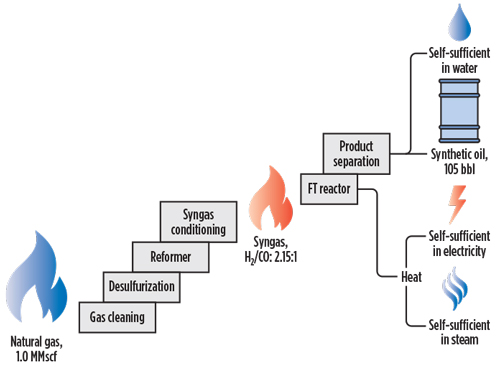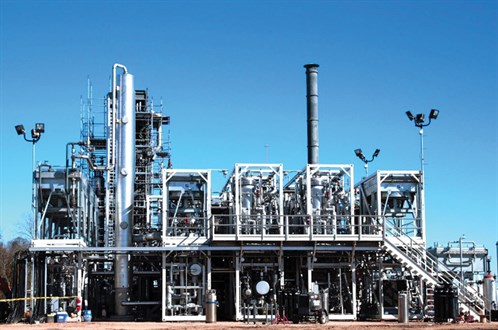GTL Viewpoint
Dmitry Popov, Vice President—Commercial, INFRA Technology
Synthetic fuel production technology, known as GTL, was invented in the 1920s. One of the best-known ways to create synthetic fuel is through Fischer-Tropsch (FT) synthesis. FT technology was initially developed in Germany to solve petroleum shortages leading up to World War 2. By 1944, Germany was producing 124 Mbpd of synthetic fuels from coal at 25 FT plants. Next-generation technology was developed in South Africa, which sought to support its economy without oil. In the 1970s, the technology evolved in Western Europe and the US.
While the FT process itself is well proven, its application remains scarce because it requires large capital investment in equipment, followed by high operational and maintenance costs. The main challenges posed by FT technology include low productivity of the FT reactors, short catalyst lifetime and, most importantly, the need to build petrochemical plants to process the FT product—hard waxes—into marketable liquid motor and aviation fuels.
As petroleum prices remain high, new discoveries make natural gas abundant and cheap by comparison, and more advanced energy companies are exploring ways to reduce the CAPEX of synthetic fuel production. As part of this goal, these companies are looking into building smaller-scale, modular plants that can operate in remote locations. Fundamental economic factors validate the importance of obtaining synthetic crude. Due to its consumer properties, the liquid fuel is approximately three times more expensive than gas in terms of energy value—i.e., the combustion of 25 g of crude oil and 20 g of gas produces the same amount of energy: 1 MJ.
New wave of GTL. INFRA Technology represents the new generation of GTL technology allowing the production of light synthetic crude oil straight out of the FT reactor, with four-fold performance and without byproducts (Fig. 1). The process does not require additional processing of waxes, and synthetic crude oil is fully compatible with the existing oil infrastructure.
|
Fig. 1. New technology applications, particularly modular and smaller-scale technologies, are emerging to replace previous plans for large-scale projects. |
 |
The technology was made possible by creating a novel catalyst using cobalt as active metal in a multicomponent composite. Elimination of certain processing stages and production of high-quality, single-liquid product makes INFRA’s GTL solutions economically feasible from small-scale, pre-engineered, standardized, modular (as small as containers), easily deployed and transportable units (Fig. 2), all the way to large-scale, integrated gas processing plants.
|
Fig. 2. The M100 standard container size design makes it easily transportable. |
 |
Projected future trends in GTL. INFRA’s GTL technology allows for building low-cost, compact, modular GTL plants and can have wide industry implications. Firstly, it can unlock the potential of large, remote gas fields that remain stranded due to the lack or cost of gas transportation infrastructure. Secondly, it can solve the issue of profitable elimination of associated gas flaring by converting wasted resources into high-value-added hydrocarbon product.
Environmental benefits of GTL fuels. Air pollution is one of the main environmental problems existing in large cities, and is mainly caused by a number of toxic compounds that are emitted into the atmosphere when cars burn mineral motor fuel. Synthetic fuel is completely free from impurities, producing only steam and carbon dioxide when burned. This fuel is fully compatible with all existing diesel and petrol engines, as well as transportation infrastructure and fuel station distribution systems.
Despite the rapid development of electric vehicles, most methods of sea, air and land transportation require the consumption of fuel derived from crude oil, and this trend will persist in the next few decades. Making cities and the planet cleaner is a very important advantage of synthetic fuels. GP
 |
Dmitry Popov joined INFRA Technology LLC in 2011 and is responsible for the financial and commercial aspects of the business. He spent most of his previous career in corporate finance with international financial institutions. Mr. Popov graduated from Moscow State University and holds an MBA degree from the University of Houston.




Comments